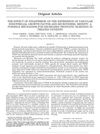Dihydrotestosterone And The Prostate: The Scientific Rationale For 5α-Reductase Inhibitors In The Treatment Of Benign Prostatic Hyperplasia
September 2004
in “
The Journal of urology/The journal of urology
”
TLDR Drugs that block DHT production can effectively treat enlarged prostate and improve urinary issues with some sexual side effects.
The document reviewed the role of dihydrotestosterone (DHT) in benign prostatic hyperplasia (BPH) and the efficacy of 5α-reductase inhibitors in its treatment. DHT and testosterone play complementary roles in male physiology, with DHT potentially amplifying testosterone effects. Recognizing DHT's central role in BPH has led to the use of 5α-reductase inhibitors, which reduce prostate volume, improve symptoms, enhance urinary flow, and lower the risks of acute urinary retention and BPH-related surgery. Adverse effects, mainly decreased libido, impotence, and ejaculatory dysfunction, occur in a minority and tend to diminish with prolonged treatment. The study concluded that DHT is crucial in BPH development, and 5α-reductase inhibitors are effective for long-term BPH management.









